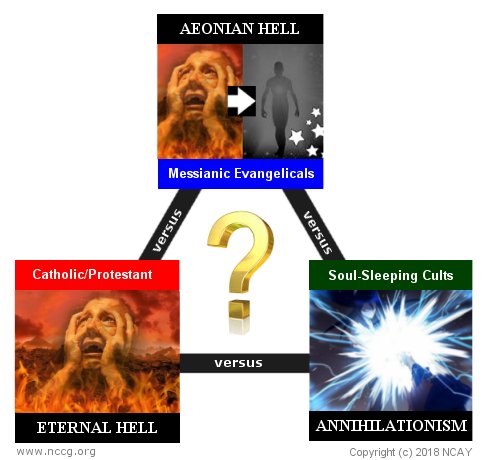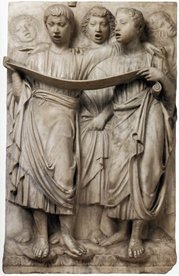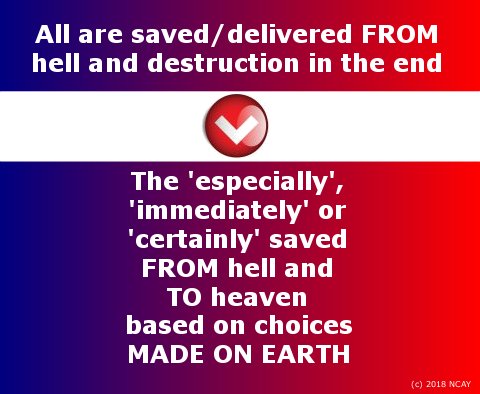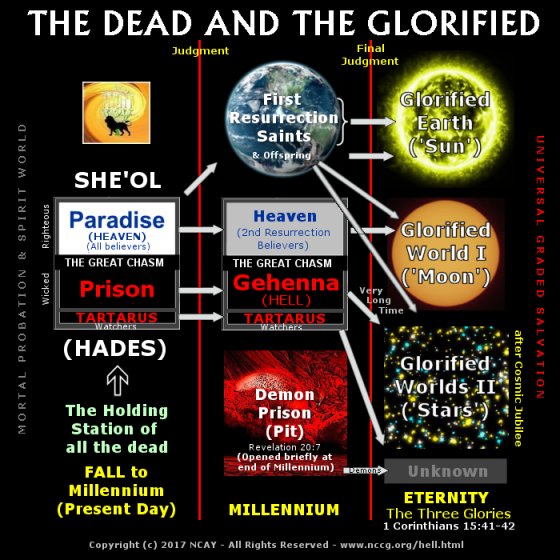Month 10:14, Week 2:6 (Sheshi/Kippur), Year:Day 5949:278 AM
2Exodus 5/40
Gregorian Calendar: Thursday 20 December 2018
Pauline Universalism I
The Case for Cosmic Reconciliation

The Latest 'Hot Potato'
One of the hottest theological potatoes - if not the hottest one - that I have ever picked up to closely examine is the one called Universal Salvation - the doctrine that hell will at some point be emptied of its occupants and the whole Cosmos will be finally reconciled to its Creator. Tradition about the fate of the wicked in the next life, being what it is, has meant that there have been very few fellow believers willing to pick up this potato, especially evangelicals, who have had drummed into them for half a millennium that the wicked will be tortured in hell for eternity or, if they are of that small minority called annihilationists (also known as 'cessationists', not to be confused with those who believe the spiritual gifts have ceased), simply cease to exist after the Final Judgment, executed, as it were, by 'Jehovah's Firing Squad'.
Eternal or Aeonian?
One of the key arguments used against these two doctrines of punishment for the wicked is that the biblical words used to describe time - olam in Hebrew and Aionios in Greek - do not mean 'eternity' or 'forever' but a fixed, if very long, period of time. The words are therefore better translated as 'æon' (aeon), 'eon' or 'age'. The argument put forth by universalists is that the suffering of the wicked in hell is of fixed duration, 'aeonian', or 'age-long'. And though the linguistic evidence for this interpretation is really beyond dispute, as I have shown in numerous articles on the Aeonian Time website, the proponents of eternal torture and annihilationism insist that olam - and in particular, aionios (since the New Testament discusses this topic far more than the Old) - can be interpreted variously and that the consensus of Evangelicals (and Catholics, for that matter) is that it means 'eternal'.

Universalist Scriptures That Do Not Use Aionios
I am not getting into that discussion again here. Rather I am shifting it to other scriptures that express the idea of universal reconciliation without recourse to using disputed words like aionios. And as will be presently seen, there can be no reasonable doubt that Paul was a universalist. If a handfull (two or three Torah witnesses) of scriptures can be shown, beyond any measure of a doubt, that the apostle is talking about a day when all creatures will be reconciled to Yahweh-Elohim, then those passages that address the 'aeons' can, and must, be interpreted in the same light otherwise you end up with two sets of contradictory scriptures. Then you must either adjust your doctrine or become a dishonest Christian/Messianic or convert to atheism.
The Bible Translation Used Here
I am going to use the modern scholar's version, the New Revised Standard Version (NRSV) for the most part and, where there are differences, the English Standard Version (ESV) so that both liberal and conservative scholarship is represented. I will use other versions also to give further contrast. These two translations (NRSV & ESV) don't actually disagree with one another in any of the citations I shall be using so there is no linguistic controversy. There is broad scholarly consensus between all the wings. I am going to messianise the text, as I always do, so that the Hebrew Names for Deity appear alongside the traditional English ones (e.g. Elohim/God, Yah'shua/Jesus, etc.). This does not change the meaning of the texts used in any way and maintains the consistency of style we use in our writings.
The Pre-Pauline Doctrinal Hymns
 The first and probably most important Pauline universalist passage is the pre-Pauline hymn in Philippians 2:6-11 which most scholars agree was sung by the first believers, a hymn Paul has cited to make a doctrinal statement. Because people didn't own Bibles in those days - indeed, when Paul was writing, there wasn't even a 'New Testament' yet - the important truisms of the emunah (faith) were recorded in song so that the core beliefs could be memorised and celebrated in worship. So what we have in these hymns, which are scattered throughout the Messianic Scriptures (New Testament), are amongst the first credal statements of the early Messianic Community (Church). By this means, the essential doctrines of the community were both preserved and transmitted, a reason why in our day doctrinally accurate songs and hymns are very important.
The first and probably most important Pauline universalist passage is the pre-Pauline hymn in Philippians 2:6-11 which most scholars agree was sung by the first believers, a hymn Paul has cited to make a doctrinal statement. Because people didn't own Bibles in those days - indeed, when Paul was writing, there wasn't even a 'New Testament' yet - the important truisms of the emunah (faith) were recorded in song so that the core beliefs could be memorised and celebrated in worship. So what we have in these hymns, which are scattered throughout the Messianic Scriptures (New Testament), are amongst the first credal statements of the early Messianic Community (Church). By this means, the essential doctrines of the community were both preserved and transmitted, a reason why in our day doctrinally accurate songs and hymns are very important.
The Philippian Universalist Hymn
So here is Paul, quoting an early Christian/Messianic hymn, whose existence scholars across the board are pretty much agreed on, quoting its words in order to affirm his vision of a future cosmic reconciliation and universal salvation:
"Let the same mind be in you that was in Messiah Yah'shua (Christ Jesus),
who, though He was in the form of Elohim (God),
did not regard equality with Elohim (God) as something to be exploited ('grasped' - ESV),
but emptied Himself,
taking the form of a slave,
being born in human likeness.
And being found in human form,
He humbled Himself
and became obedient to the point of death -
even death on a cross.
"Therefore Elohim (God) also highly exalted Him
and gave Him the Name
that is above every name,
so that (hina) at the Name of Yah'shua (Jesus)
every knee should bend
in heaven and on Earth and under the Earth,
and every tongue should confess
that Yah'shua the Messiah (Jesus Christ) is Master (Lord),
to the glory of Elohim (God) the Father"
(Phil.2:6-11, NRSV)
Three Acknowledgments of Universalism by Paul
There are three reasons why the second part of this hymn extract is to be viewed as Paul's acknowledgement, and future declaration, of cosmic reconciliation and universal salvation:
- 1. "Every knee...under the Earth" designates everyone in Sheol (Hades), both those incarcerated in the Prison ('Hell') part and those in the Paradise ('Heaven) part [1], not everyone 'down under' in Australia;
- 2. For Paul, the confession "Yah'shua the Messiah (Jesus Christ) is Master (Lord)" makes one a Christian/Messianic and cannot be sincerely uttered apart from the inspiration of the Ruach haQodesh (Holy Spirit):
"Therefore I want you to understand that no one speaking by the Ruach Elohim (Spirit of God) ever says, 'Let Yah'shua (Jesus) be cursed!' and no one can say 'Yah'shua (Jesus) is Master (Lord) except by the Ruach haQodesh (Holy Spirit)" (1 Cor.12:3, NRSV); and
- 3. Most importantly, the hymn as a whole is based on the invitation to universal salvation in Isaiah 45:
"Turn to Me and be saved,
all the ends of the Earth!
For I am Elohim (God) and there is no other
By Myself I have sword,
from My mouth has gone forth in righteousness
a word that shall not return:
To Me every knee shall bow,
every tongue shall swear" (Is.45:22-23, NRSV)
The Purpose/Result Clause is Unambiguous
Please note in Philippians 2:10 the Greek word hina ("so that", "in order that") begins a purpose or result clause that specifies not what ought to happen, but what in fact will happen. That is confirmed by the use of Isaiah 45:22-23 as the source of inspiration for the Philippian hymn: "Turn to Me and be saved, all the ends of the earth!...To Me every knee SHALL bow and every tongue SHALL swear." Here Yahweh predicts not what every knee and tongue ought to do, but rather what they actually will do. It is an unconditional prophecy about a future event, beyond any dispute.
Confirmed by Romans 11
This universalist interpretation finds independent confirmation in the cosmic redemption text in Romans 11:
"For Elohim (God) has imprisoned all in disobedience so that He might be merciful on all...For from Him and through Him and [back] to Him are all things" (Rom.11:32,36, NRSV).
Three More Acknowledgements of Universal Reconciliation
Once again, three points demonstrate a vision of universal reconciliation:
- 1. The two "all"'s (v.32) are parallel and universal;
- 2. In Romans 11:32,36 Paul does not consider the Fall from the perspective of our willful disobedience, but from the perspective of Elohim's (God's) providential plan, after the event, in which humanity is imprisoned and about which humanity therefore has no choice but to inherit the fallen Adamic nature upon incarnating; and
- (3) Paul grounds the goal of divine chesed or mercy on all on the triumphal cosmic reconciliation in which all the creation that derives from Elohim (God) will ultimately be reconciled and restored to Him:
"For from Him and through Him and [back] to Him are all things" (Rom.11:36, ESV).
The Divine Desire to Save Everyone
Paul takes for granted Yahweh's desire to save everyone, not just the elect [2]:
"...Elohim (God) our Saviour, who desires (thelo, 'will have' - KJV; 'wants' - JNT/CJB, OJB) everyone to be saved and to come to the knowledge of the emet (truth)" (1 Timothy 2:4, NRSV).
Can Yahweh's Desires Be Thwarted?
This divine desire raises the question of whether Yahweh's will can be permanently thwarted by our disobedience. Can Yahweh's desires be overturned by our freewill? If you're a Calvinist who believes in absolute irresistable Divine Sovereignty and no human free-will, of course not. Then you must accept Yahweh will save everyone! If you're are an Arminian believing in limited free will, then in this matter Yahweh's Sovereignty overrides even that. This is His cosmic desire, will and design. He "will have everyone to be saved".
Yahweh Will Be Merciful on All
Paul excludes the possibility Yahweh's desire not being realised in his bold declaration of divine providence:
"Elohim (God) has imprisoned all in disobedience so that (hina) He may be mercful on all" (Rom.11:32, NRSV).
The Fall, Man's Sin Nature, and Yahweh's Justice
Yahweh is neither ignorant nor is He ever surprised. The Fall did not surprise Him since in His omniscience He knew Adam and Eve would fall, even before He created them. He also knew all of our first parents' offspring would be fallen too and all of humanity. He also has a plan of salvation worked out. So nothing that happened since He made man has ever taken Him by surprise nor could it ever take Him by surprise either. He has what some Christian philosophers call Middle Knowledge. This is explained in my article on Molonism which you should study before continuing otherwise you will not made sense of what I am about to say.
The Will of Yahweh Pre- and Post-Fall
In Romans 11:32 Paul considers the Fall from the perspective that it was always Yahweh's design to imprison us with a fallen nature that would make us disobey Him. If we believe Him to be Omniscient and Sovereign, then we are forced to believe that, otherwise the present situation we find ourselves in would never have been permitted. If it hadn't been His design, He would have prevented our first parents from having offspring. Adam and Eve were supposed to resist the forbidden fruit but Yahweh knew they would not. They were not supposed to become 'godlike' and know the difference between 'good and evil', but He knew they would.
No Choice in Inheriting the Sin Nature
How, then, can Elohim (God) be just if our sinful nature is guaranteed by divine decree? No one had the choice of 'opting out' of inheriting the carnal nature. Since the children of Adam and Eve had no choice but to inherit a fallen nature, then it was Yahweh's will that they do so. How, then, is Divine Justice to be found? By Yahweh's ordaining that all of us ultimately benefit from His mercy and grace at a final Cosmic Jubilee!
Not Merely a Potential but an Actual Saviour
In that sense, Elohim (God) is not merely the potential Saviour of all humanity; He is our actual Saviour:
"...Elohim (God), who is the Saviour of all people, especially (malista) of those who believe" (1 Tim.4:10, NRSV).
The 'Most Immediately' and 'Most Certainly' Saved
Notice that there are at least two categories of those who are saved which, using other Scriptures, we can flesh out by assigning them to pre- and post-millennial resurrection. Everyone is saved but there is another set-apart or distinctly favoured category of people who are especially saved. What does that mean? The Greek word malista means "especially" in the sense of "most immediately" or "most certainly", and leaves open the potential for the ultimate salvation of all. There are those who are 'most immediately' and 'most certainly' saved and then there are all the rest of whom Yahweh is also the Saviour.

The Saved Who Toil and Struggle
What this actually means may not be very clear at first but then Paul doesn't need it to be at this stage. All he says is that this group of the saved "toil and struggle" (1 Tim.4:10a, NRSV). These are the people who actually do something about their salvation. They are making active choices, unlike the rest of earth-bound humanity which is being swept along by the tide of sin. The latter are definitely not being saved in this aeon (age) and, as other Scriptures attest, not in the millennial one after it either and quite possibly not even in one or more aeons after that. This is all fleshed out in other articles of which the diagram below is a grand summary:

Sealing the Universalist Promise
Similarly, Romans 11:32 seals the promise that God "will be merciful to all" (Rom.11:32, NRSV) with an assurance of cosmic restoration: "For from Him and through Him and [back] to Him are all things" (Rom.11:36, NRSV). You cannot be 'merciful' to those you torment forever or exterminate.
Another Universalist Pre-Pauline Hymn
Universalism may also be implicit in the pre-Pauline hymn in Colossians 1:15-20:
"...in Him (Messiah) all things hold together...Through Him Elohim (God) was pleased to reconcile to Himself all things, whether on earth or in heaven, by making shalom (peace) through the blood of His cross" (Col.1:20, NRSV).
Every Knee Shall Bow and Every Tongue Confess
It is against this background that the pre-Pauline hymn in Philippians 2:6-11 is so relevant to universalism. Every knee in Hell bows before Messiah and every tongue in Hell makes the saving confession:
Only the Saved Can Bow and Confess
Scholars recognise that these allusions to "every knee" and "every tongue" are inspired by Isaiah 45:22-23, where the professed allegiance is inevitable, not just prescribed. (Paul's own quotation of Isaiah 45:22-23 is irrelevant to this point.) So there really is no other way to honestly interpret this passage. The anti-universalists do, of course, twist and mutilate their interpretation of it.

Doing the Grammar
In Philippians 2:9-11 which we examined in the beginning, the Greek word hina ("in order that" or "so that") begins a purpose or result clause that specifies not what ought to happen, but what in fact will happen. We saw that that is confirmed by the use of Isaiah 45:22-23 as the source of inspiration for the Philippian hymn:
"Turn to me and be saved, all the ends of the earth!..To me every knee WILL bow and every tongue SHALL swear allegiance" (Is.45:22a, 23b, ESV) or "confess to Elohim (God)" (LXX, ESV footnote).
Every Living Soul Will Do This
Here God predicts not what every knee and tongue ought to do, but rather what they actually will do. This is a dead certainty. This will happen, every human being - past, present, and future - will do it.
Hina for Those Who Receive Aeonian Life
In John 3:16 the Greek word hina occurs again with the subjunctive that for those who are believing, such belief will definitely (not merely possibly or potentially) result in them obtaining aionian or age-long life:
"For Elohim (God) so loved the world that He gave His only [begotten] Son, so that (hina) everyone who believes in Him may (should, shall) not perish, but may (should, shall) have eonian (age-long) life" (Jn.3:16).
Hina for the Salvation of the World
In the very next verse, Jn.3:17, the hina occurs again with the subjunctive:
"Indeed, Elohim (God) did not send the (His) Son into the world to condemn (hina) (that He might judge) the world, but in order that (hina) the world might be saved through Him" (Jn.3:17, NRSV, with Berean Literal Bible alternative renderings in parentheses).
Here again, like in v.16, is there any doubt about what the hina is referring to, and that the world - shall - be saved?

An Eastern Orthodox Scholar Confesses Universalism
Eastern Orthodox scholar David Bentley Hart views John 3:17 as a clear proof text for universalism:
"While we are on the topic, however, I might mention that, alongside various, often seemingly contradictory images of eschatological punishment, the New Testament also contains a large number of seemingly explicit statements of universal salvation, excluding no one (for instance, John 3:17; 12:32,47; Romans 5:18-19; 11:32; 1 Corinthians 15:22; 2 Corinthians 5:14,19; Philippians 2:9-11; 1 Timothy 2:3-6;4:10; Titus 2:11; Hebrews 2:9; 2 Peter 3:9; Colossians 1:19-20; 1 John 2:2 ... to mention only some of the most striking). To me it is surpassingly strange that, down the centuries, most Christians have come to believe that the former class of claims - all of which are metaphorical, pictorial, vague, and elliptical in form - must be regarded as providing the 'literal' content of the New Testament's teaching, while the latter - which are invariably straightforward doctrinal statements - must be regarded as mere hyperbole. It is one of the great mysteries of Christian history (or perhaps of a certain kind of religious psychopathology)" (Eclectic Orthodoxy - 11 Feb 18 5).
Are the Pauline Universalist Passages Really Just Hyperbole?
This is a good question. Why have clear universalist passages been 'explained away' as mere hyperbole? I could give you a number of reasons but I think the most likely one is because a doctrine of eternal hell was historically more useful politically for keeping the plebians in line by terrorising them into conformity. Doubtless to some believers universalism simply isn't 'palatable' to them, for like the brother of the Prodigal Son they would much rather people be punished than finally receive grace. The issue that most people have is invariably a lack of love.
The Prodigal Son and a Question of Justice
What about Yahweh's justice? Well, did not the Prodigal Son go through an earthly kind of hell before he came to his senses? (Lk.15:11-32) He was away suffering a few years after his fortunes reversed whereas the wicked who refuse salvation in this life will be sent to suffer in the metaphorical 'pig-pit' of hell for one or more aeons (i.e. very long periods of time) until they have come to their senses and are willing to bow the knee and confess with their tongues that Yah'shua (Jesus) is truly Messiah. How can that not be just...and loving at the same time?
When Did Paul Become a Universalist?
It's impossible to know, of course, at which point Paul arrived at his universalism, or whether he already was a universalist. As a brilliant scholar and versed scriptorian he would have known Isaiah 45:22-23 well enough. His Messianic/Christian theology, at any rate, developed from the time of 2 Corinthians 12:2-4 (when he, or a friend of his, had been shown something during a near-death experience or at least some kind of an out-of-body experience) to the time years later when he wrote Romans chapters 9-11 and starts affirming his teaching of Eventual Universal Reconciliation as we have just seen in two or three of the many possible passages that could have been examined.
'Might' Be Saved?
A word about some slippery translations which add an element of doubt about universal salvation in order, one supposes (since we know that denominational translation bias is very real), to maintain the tradition of eternal hell or the annihilationist position. The New King James Version (NKJV) is representative of this rendition:
"For God did not send His Son into the world to condemn the world, but that the world through Him might be saved" (John 3:17, NKJV)
The Aramaic Settles the Ambiguity
Other versions like the NASB and NIV prefer "should" and "shall", respectively, to "might", though none of these words are in the Greek. The ambiguity is removed by looking at the original Aramaic:
"For Elohim (God) did not send His Son into the world to condemn the world, but to give chayim (life) to the world through Him (literally 'by His hand')" (John 3:17, AENT; also HRV).
Though this is not explicitly a universalist passage the original rendering does not exclude that interpretation whereas the versions I cited earlier lend an element of possible doubt.
Messiah, the Firstfruits, and Then All the Rest
Let's look at another Pauline passage:
"So as all die in Adam, even so all shall be made alive IN MESSIAH. But each in his own order: Messiah (Christ), the bikkurim (firstfruits), then at His coming those who belong to Messiah, then the FULFILLMENT (Gk. to telos, i.e. the rest), when He hands over the kingdom to Elohim (God) the Father" (1 Cor.15:22-24).
Four More Good Universalist Reasons
Once again, and for four good reasons, there can be no doubt that this too is a universalist passage:
- 1. The first 2 "all's" are parallel and hence universal. Since believers and unbelievers alike are raised "in Messiah", they will ultimately be saved;
- 2. "But each in his own order" In other words, don't get the sequence wrong. Now such a cautionary statement would be absurd, if the intended sequence were confined to first Messiah, then believers at Messiah's coming. But it becomes meaningful if it points to a 3-fold sequence:
- i. Messiah; then
- ii. Believers at His coming; and then
- iii. The "fulfilment" or everyone else.
A 3-fold sequence would then imply the prospect of universal salvation;
- 3. Paul's phrase "then to telos" is always translated "then [comes] the end." But there is no verb 'comes' in the Greek and "to telos" can also mean "the fulfillment" and can thus refer to a completion of the resurrection process that includes unbelievers; and
- 4. Later in this chapter Messiah's act of handing over the Kingdom to the Father entails the result that "Elohim (God) may be all in all (panta en pasin)" or "everything to everyone" (1 Cor.15:28) [3].
Absurd Anti-Universalist Arguments
Clearly such a cautionary statement would be absurd if the intended sequence were confined to first Yah'shua (Jesus) and then Christians/Messianics at His coming. Why absurd, you may ask? Because no reader needs a reminder that Messiah was raised before the resurrection of believers at His second Coming. So the phrase "But each in his own order" can be informative only if it points to a third item in the sequence ("then...then") and that third item is "then the fulfilment" or "completion" - in other words, the resurrection of non-believers. Since those non-believers would be raised "in Messiah", their ultimate salvation would then seem assured.
Aeons Not Needed to Prove Universalism
In none of the passages examined have I used the aeonian time argument which, though overall more than convincing enough linguistically and historically to the objective seeker, is nevertheless manipulatable by a skilled operator. In a later article I will make in depth study of the ten major 'twists' used by the anti-universalists and show the unsoundness of their reasoning.
Judgment is the Main Issue
As I have discussed in many recent sermons and articles, the ultimate fate of the wicked was not a primary concern of the Saviour. Had He been concerned, the evangelists would have noted it and Paul would not have needed a theology of it. As it is, Paul mostly hints about the long-term fate of souls. He is concerned about Judgment, just as Yah'shua (Jesus) was, but focuses on the fact that it will be impartial and be the same for all. Romans 2:1-16 goes into some detail, showing the rôle of Torah and how those who never knew Torah or Yah'shua (Jesus) will be judged (Rom.2:12ff.). The good news for everyone is that
"...there will be glory, honour, and shalom (peace) for everyone who does what is good...[because] Elohim (God)...shows no partiality" (Rom.2:1-11, KNT).
The Annhilationist Resurrection Connundrum
For the wicked, then, there will be infamy, shame, and a racked conscience. Which brings us back to the question I have raised before to point out the absurdity of annihilationism: since everyone - the saved and the unsaved - are resurrected to face the Judgment, and since the resurrected are physically immortal, how can they be annihilated? What is immortal cannot perish. Though there are other good scriptural grounds for eliminating annihilationism from our enquiries, this surely is an important one.
The Dispute With Roman Christianity and Its Daughters
Which leaves us with eternal torment, the traditional view of hell. That hell is a place of torment is not denied (Mt.11:23; 14:42; 25:41,46; Rev.20:13) nor who it is for (Ps.9:17; Prov.5:5; 7:27; 9:18; Mt.23:15; 25:41). What's in dispute - the conroversy we have with orthodox Roman Christianity and its Protestant offshoots - is its duration and purpose. Is hell 'forever' or will it one day be 'untenanted', having served its purpose as a terrible but necessary place of correction and purging for the wicked.
Conclusion
Without going into any kind of detail, aside from pointing out the three glories (1 Cor.15:41-42a), what Paul is, as we have seen, most concerned to emphasise is that every soul - past, present, and future - will one day come to acknowledge and proclaim the Messiahship and Lordship of Yah'shua the Messiah (Jesus Christ), both the good and wicked, the saved and unsaved from earth's probationary life, at different times, and that such an acknowledgement and proclamation can only be done through the Ruach (Spirit) (Phil.2:6-11; 1 Cor.12:3). And the only way that can happen is if the wicked have, at last, been delivered out of their torment and will have some sort of a continuing existence, albeit it without the glory and honour reserved for those who trusted and obeyed Messiah in mortality.
Endnotes
[1] See the introductory article to the Hell website
[2] This directly contradicts the Calvinist belief that Yahweh only desires to save a predestined 'elect' since He has no interest in the predestined 'damned' - they're just there to serve as props in the drama being enacted for the benefit of the predestined-to-salvation (somehow).
[3] I have heard one universalist argue (and he may be totally alone in this belief for all I know unless he's a closet Mormon) that part of that restoration is proxy baptism for the unrighteous dead (1 Cor.15:29) because Paul argues that such proxy baptisms would be pointless if Elohim (God) were not destined to become all in all. This I am not personally convinced of for a number of reasons. See Baptism for the Dead? and What does the Bible Mean When It Refers to Baptism of the Dead? for reasons why I am sceptical.
Continued in Part 2
 This article is the first part of a series
This article is the first part of a series
 Go to the Universal Salvation website
Go to the Universal Salvation website


|


